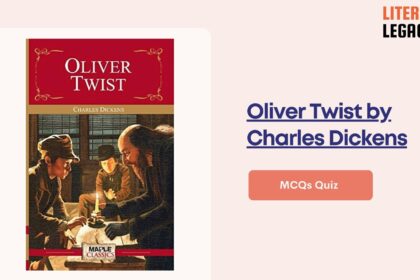1. What is the central idea of the monologue ‘All the world’s a stage’?
A. There are only seven stages of life.
B. Life is like a stage on which people play roles.
C. One’s life is predetermined from birth.
D. Life is a series of struggles.
Answer: Life is like a stage on which people play roles. (B)
The monologue compares life to a stage, emphasizing the different roles people play at various stages.
2. According to the monologue, what is the best part of one’s life?
A. Old age and dependency
B. When one has lost control of their senses
C. When one is a lover, soldier, and judge
D. Infancy and childhood
Answer: When one is a lover, soldier, and judge (C)
The speaker describes the lover, soldier, and judge stage as the best part of one’s life.
3. How many stages of life are described in the monologue?
A. Ten
B. Five
C. Nine
D. Seven
Answer: Seven (D)
The monologue describes the seven ages of man, from infancy to old age.
4. What happens to people in the later stages of life, according to the monologue?
A. They become more confident.
B. They gain control of their senses.
C. They lose control of their senses.
D. They become more powerful.
Answer: They lose control of their senses. (C)
The speaker describes how people lose control of their senses and eventually can’t take care of themselves in old age.
5. What is the speaker’s tone in the monologue?
A. Critical and judgmental
B. Humorous and sarcastic
C. Angry and aggressive
D. Reflective and introspective
Answer: Reflective and introspective (D)
The speaker’s tone is reflective and introspective, as they contemplate the various stages of life.
6. What is the main theme of the monologue ‘All the world’s a stage’?
A. The role of women in society
B. The role of the king in a kingdom
C. The comparison of life to a stage play
D. The importance of education
Answer: The comparison of life to a stage play (C)
The monologue compares life to a stage play, suggesting that men and women are players who take on different roles throughout their lives.
7. What is the origin of the concept of the ‘seven ages’?
A. Modern psychology
B. Renaissance humanism
C. Medieval philosophy
D. Ancient Greek philosophy
Answer: Medieval philosophy (C)
The concept of the ‘seven ages’ dates back to medieval philosophy, where groups of seven were constructed for theological reasons.
8. What is the meter of the monologue ‘All the world’s a stage’?
A. Free verse
B. Rhyming couplets
C. Trochaic tetrameter
D. Unrhymed iambic pentameter
Answer: Unrhymed iambic pentameter (D)
The monologue is written in part in blank verse, or unrhymed iambic pentameter, which means the lines do not rhyme, but contain five sets of two beats.
9. Who is the speaker of the monologue ‘All the world’s a stage’?
A. Orlando
B. Jaques
C. Duke Senior
D. Rosalind
Answer: Jaques (B)
The speaker of the monologue is Jaques, a melancholy character in the play As You Like It.
10. What is the name of the play in which the monologue ‘All the world’s a stage’ appears?
A. A Midsummer Night’s Dream
B. Romeo and Juliet
C. As You Like It
D. Hamlet
Answer: As You Like It (C)
The monologue ‘All the world’s a stage’ is an excerpt from William Shakespeare’s play As You Like It.
11. What is the length of the monologue ‘All the world’s a stage’?
A. Forty lines
B. Thirty lines
C. Twenty lines
D. Twenty-eight lines
Answer: Twenty-eight lines (D)
The monologue ‘All the world’s a stage’ is twenty-eight lines long.
12. What literary device is used in the phrase ‘creeping like a snail’
A. Personification
B. Metaphor
C. Alliteration
D. Simile
Answer: Simile (D)
Simile is a figure of speech that compares two different things using ‘like’ or ‘as’. In this case, it compares the movement of someone to a snail.
13. What is the effect of the repetition of words like ‘ans’ and ‘age’ in the monologue?
A. It creates a sense of rhythm
B. It confuses the audience
C. It makes the speech more humorous
D. It adds emphasis to the words
Answer: It adds emphasis to the words (D)
Repetition is a literary device used to add emphasis or stress on certain words or ideas.
<
A. Metaphor
B. Synecdoche
C. Simile
D. Alliteration
Answer: Synecdoche (B)
Synecdoche is a figure of speech that uses a part to represent the whole, or vice versa.
15. What is the effect of the use of alliteration in the monologue?
A. It makes the speech more formal
B. It makes the speech harder to understand
C. It distracts the audience
D. It creates a sense of rhythm and musicality
Answer: It creates a sense of rhythm and musicality (D)
Alliteration is a literary device that uses the repetition of initial consonant sounds to create a musical or rhythmic effect.
16. What is the central concept of the monologue, as presented through the extended metaphor?
A. Life is a journey
B. Life is a stage
C. Life is a battlefield
D. Life is a dream
Answer: Life is a stage (B)
The monologue presents life as a stage, with people playing different roles throughout their lives.
17. What is the literary device used in the phrase ‘pipes / And whistles in his sound’
A. Onomatopoeia
B. Assonance
C. Consonance
D. Alliteration
Answer: Onomatopoeia (A)
Onomatopoeia is a word that imitates the sound it describes, in this case, the sounds of pipes and whistles.
18. In which stage of life is a person described as a soldier?
A. Middle Age
B. Youth
C. Boyhood
D. Adolescence
Answer: Youth (B)
The youth stage is identified by Shakespeare’s depiction of a soldier.
19. What is the characteristic of the voice in the Old Age stage?
A. It turns into childish trebles
B. It becomes more confident
C. It becomes more assertive
D. It becomes more commanding
Answer: It turns into childish trebles (A)
In the Old Age stage, the voice becomes weak and turns into childish trebles.
20. In which stage of life is a person described as a judge?
A. Boyhood
B. Old Age
C. Middle Age
D. Youth
Answer: Middle Age (C)
The Middle Age stage is characterized by a person practicing law, like a judge.
21. What is the main characteristic of the Boyhood stage?
A. Composition of sad songs
B. Fear of dire challenges
C. Maturity and wisdom
D. Unwillingness to go to school
Answer: Unwillingness to go to school (D)
The Boyhood stage is characterized by a school-going boy who is unwilling to go to school.
22. What is the outcome of the final stage of life?
A. Loss of everything
B. Gain of independence
C. Attainment of wisdom
D. Achievement of success
Answer: Loss of everything (A)
In the final stage of life, death, the outcome is that a person is left with nothing.
23. What is the main characteristic of Infancy?
A. Fear of dire challenges
B. Composition of sad songs
C. Unwillingness to go to school
D. Image of a baby crying softly
Answer: Image of a baby crying softly (D)
The Infancy stage is characterized by an image of a baby crying softly and throwing up in the caregiver’s lap.
24. What is the main characteristic of Adolescence?
A. Fear of dire challenges
B. Maturity and wisdom
C. Composition of sad songs
D. Unwillingness to go to school
Answer: Composition of sad songs (C)
The Adolescence stage is characterized by a dejected lover who composes sad songs for his beloved.
25. What is the change that occurs in a person’s mind in the Old Age stage?
A. It becomes more independent
B. It becomes more confident
C. It becomes more dependent
D. It becomes more assertive
Answer: It becomes more dependent (C)
In the Old Age stage, the mind becomes dependent on others.
26. What is the main concept conveyed by Jacques’ statement ‘All the world’s a stage’?
A. That actors are the most important people
B. That people are merely players in life
C. That life is short and fleeting
D. That one’s profession defines their identity
Answer: That people are merely players in life (B)
The metaphor sets up the idea that everyone plays different roles in life.
27. What is the effect of Jacques declaring ‘you are just as much of an actor as he is’?
A. The audience is distracted by the declaration
B. The audience is made aware of their own roles in life
C. The audience is impressed by the actor’s skill
D. The audience is confused about the role of the actor
Answer: The audience is made aware of their own roles in life (B)
The declaration makes the audience reflect on their own roles in life.
28. What is the significance of the ‘seven ages’ concept introduced by Shakespeare?
A. It emphasizes the importance of education
B. It highlights the importance of a person’s profession
C. It illustrates the various stages of human life
D. It shows the difference between actors and non-actors
Answer: It illustrates the various stages of human life (C)
The ‘seven ages’ concept is used to illustrate the various stages of human life.
29. Why is the concept of the ‘seven ages’ significant in the monologue?
A. It highlights the importance of family in life
B. It helps to illustrate the idea that people play different roles in life
C. It shows the contrast between life and theater
D. It adds a sense of drama to the performance
Answer: It helps to illustrate the idea that people play different roles in life (B)
The concept of the ‘seven ages’ helps to illustrate the idea that people play different roles in life.
30. What is the purpose of Jacques comparing people to actors?
A. To illustrate the idea that people play different roles in life
B. To show the importance of theater in life
C. To highlight the artificiality of social roles
D. To compare the skills of actors and non-actors
Answer: To illustrate the idea that people play different roles in life (A)
The comparison is used to illustrate the idea that people play different roles in life.
31. What is implied by Jacques’ statement that people ‘enter, they exit, just like performers’?
A. That people have no control over their lives
B. That people are not responsible for their actions
C. That people play different roles in life
D. That people have control over their lives
Answer: That people play different roles in life (C)
The statement implies that people play different roles in life, just like performers on a stage.
32. What is the tone of the monologue as it relates to the audience?
A. Accusatory and confrontational
B. Humorous and entertaining
C. Reflective and introspective
D. Instructive and educational
Answer: Reflective and introspective (C)
The tone of the monologue is reflective and introspective, encouraging the audience to think about their own roles in life.



